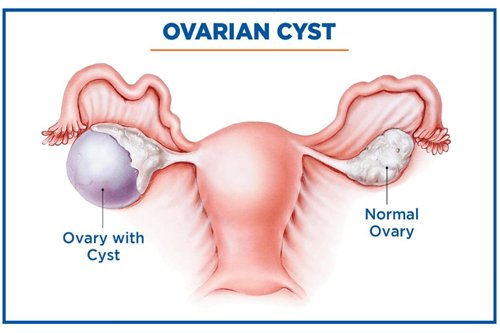Ovarian Cysts In Nagpur

Ovarian Cysts In Nagpur is a fluid-filled sac that forms on the ovary. These cysts are prevalent and can develop in women of various age groups, with a higher occurrence among those in their reproductive years. The majority of ovarian cysts are benign and remain asymptomatic. Nonetheless, there are instances where they may lead to discomfort or complications, causing pain or other issues.
Types of Ovarian Cysts
1. Functional Cysts:
Follicular cysts: These form when an egg follicle doesn’t rupture to release the egg during the menstrual cycle, causing it to swell into a cyst.
Corpus luteum cysts: After the release of an egg, the follicle transforms into a structure called the corpus luteum. Sometimes, this corpus luteum can accumulate fluid, leading to the formation of a cyst.
2. Pathological Cysts:
Dermoid cysts: These cysts contain tissue, such as hair, skin, or teeth, because they develop from cells present in eggs.
Cystadenomas: These cysts develop on the surface of the ovary and are often filled with a watery or mucous-like substance.
Endometriomas: These cysts form as a result of endometriosis, a condition where tissue similar to the lining of the uterus grows outside the uterus.
Symptoms of Ovarian Cyst
Pelvic Pain: This is one of the most common symptoms. The pain can range from a dull, aching sensation to sudden, sharp pain. The intensity and duration of pain can vary.
Bloating or Swelling: Some women may experience a feeling of fullness or bloating in the lower abdomen.
Changes in Menstrual Cycle: Ovarian cysts can sometimes disrupt the normal menstrual cycle, causing irregular periods or changes in the pattern of bleeding.
Painful Intercourse: Cysts may cause pain or discomfort during sexual intercourse.
Frequent Urination: Large cysts can exert pressure on the bladder, leading to an increased urge to urinate.
Difficulty Emptying the Bowels: Cysts, especially larger ones, may press on the rectum, causing a sensation of incomplete bowel movements or difficulty during bowel movements.
Nausea and Vomiting: In some cases, particularly if a cyst causes the ovary to twist (torsion) or if it ruptures, nausea and vomiting may occur.
Breast Tenderness: Cysts can affect hormonal balance, leading to breast tenderness or changes in breast size.
Treatments for ovarian cyst
- Pain Management: Over-the-counter pain relievers, such as ibuprofen or acetaminophen, may be recommended to alleviate pain associated with ovarian cysts.
- Hormonal Birth Control: Birth control pills (oral contraceptives) can help regulate the menstrual cycle and prevent the formation of certain types of cysts, especially functional cysts.
- Surgical Removal: If a cyst is large, persists, or causes severe symptoms, a healthcare provider may recommend surgical removal. This can be done through laparoscopy, a minimally invasive procedure, or laparotomy for more extensive cysts.
- Ovarian Cystectomy: In cases where the cyst is isolated and the rest of the ovary is healthy, a surgeon may perform a cystectomy, removing only the cyst while leaving the unaffected ovarian tissue intact.
- Oophorectomy: In more serious cases, especially if there are concerns about cancer or if the cyst is on both ovaries, the surgeon may recommend removing one or both ovaries. This procedure is called an oophorectomy.
- Pain Management for Ruptured Cysts: If a cyst ruptures, causing sudden and severe pain, pain management measures, such as pain relievers and sometimes hospitalization, may be necessary.
- Monitoring for Complications: Some cysts, such as those associated with endometriosis or polycystic ovary syndrome (PCOS), may require ongoing management and monitoring to address underlying conditions and prevent complications.
